Geri Allen Premieres Composition at Berklee
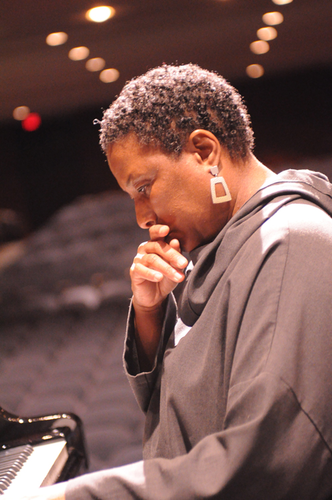
Geri Allen contemplates her piece <em>Refractions, Flying Toward the Sound.</em>
Photo by Phil Farnsworth
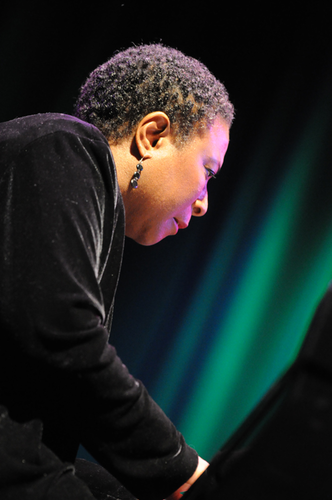
Geri Allen performs.
Photo by Phil Farnsworth

Geri Allen digs in.
Photo by Phil Farnsworth
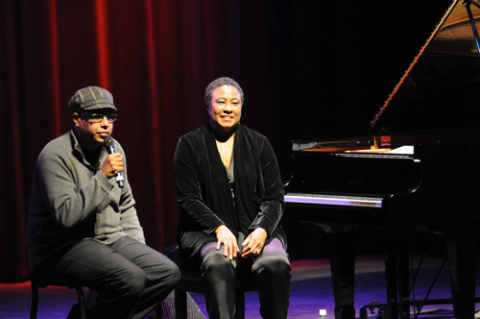
Geri Allen (right) converses with Danilo Perez.
Photo by Phil Farnsworth
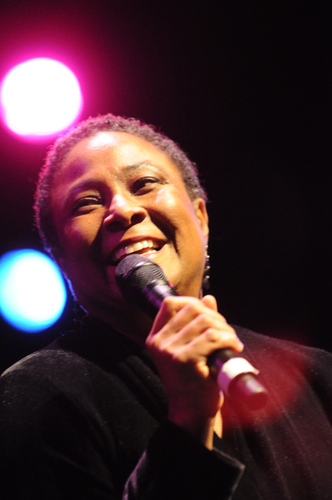
Geri Allen takes a question from the audience.
Photo by Phil Farnsworth
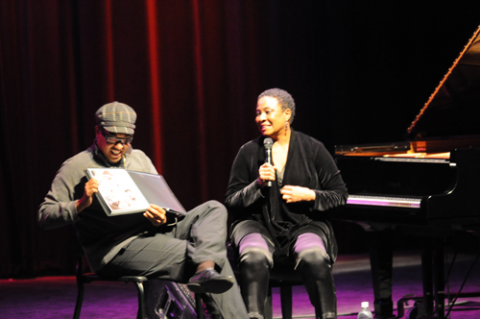
Perez displays Allen's binder of music—complete with photos of her children.
Photo by Phil Farnsworth
Geri Allen premiered her new work Refractions, Flying Toward the Sound at the Berklee Performance Center on February 26 as part of the Warrick L. Carter lecture series. She composed the piece with support provided by a Guggenheim Fellowship.
Allen delivered a frenetic soliloquy of music for almost an hour, drawing on the music of Herbie Hancock, McCoy Tyner, and Cecil Taylor, all of whom she cited in the concert program. Allen said she wanted the piece to "reinterpret their music through the prism of [her own] experience." Other influences were also apparent in her work, including pianists Thelonious Monk and Keith Jarrett, and composers Steve Reich and Olivier Messien.
Following the concert, pianist and faculty member Danilo Perez joined Allen onstage for a public interview about her work and life. The following is a condensed and edited transcript of that conversation.
Danilo Perez: What inspired you to write this piece? How did you go about choosing the motif for development?
Geri Allen: [It's also about] the legacy of the piano as it relates to each of those musicians. . . .
DP: How long did it take you to put the piece together between writing, practicing, and being a mother? When do you find the time?
GA: I usually choose to practice late at night when everybody's asleep. That's my time, I would say usually between twelve o'clock and four a.m.
DP: When do you sleep?
GA: After I get [my kids] off to school I can usually get some sleep. I like to work that way. It's very quiet, and nobody needs anything. It's hard to work when everybody needs something. I've been working on the piece about a year, since they gave me the fellowship last April.
DP: Geri, talk about your first experience coming to New York.
GA: I had graduated from Howard and thought I was ready to come to New York. . . . I had the whole summer to figure it out, to feel out the city and check out the scene, and I wasn't ready. There was a lot that I felt I needed to prepare. [So I accepted] an invitation from Dr. Nathan Davis go back to school, and I got a degree in ethnomusicology, and also I got a chance to get my footing together before I made that big splash.
When I first came to New York, I worked with a lot of different great musicians. Oliver Lake was my first professional date, and had the Jump Up Band at the time. I came into the city immediately doing a record date, which was very special. I had very high expectations, like, "Whoah! I'm going to New York, and I'm going to do a record right away?!" but that didn't last long. [laughs] After that, it was a long span before I started getting work. The word-of-mouth thing was starting to happen, but I wasn't able to make a living. So I went on the road with Mary Wilson and the Supremes for about six months. . . . And then gradually, I started getting the calls. I was out on the road when I got some of these calls, and I had to make a decision. I really came to New York to play jazz and have an opportunity to play with these great musicians.
DP: How did you meet Ornette Coleman?
GA: I worked with Charlie Haden and Paul Motian [in the Liberation Orchestra]. We started playing quite a bit of trio, enough to make a record. And at that record date, Ornette Coleman showed up. We were doing his composition 'Lonely Woman,' so that's how I first met him.
DP: Talk to us about the experience of working with Betty Carter, such a tough [person] to work with. What was the most important lesson you learned from working with her?
GA: Music was her gift to the world, and she really took it seriously. . . . The bandstand was a sacred place for her. She was misunderstood in the sense that she was really very hard-core about what she did, and she meant to give the audicence the absolute best quality that she could.
DP: How do you practice? This is one for the musicians. How do you get that independence?
GA: I'll tell you if you tell me how you get yours! You first. I think the left hand has to be locked-in and free, so I practice hands separately. I work from slow tempos and build it up when I feel comfortable with that slower tempo. And then I add a little bit at a time with the right hand, like training my left hand that it's got to stand on its own. That's how I do it. How do you do it?
DP: I do it the same way that you do, but also I read books. I try to read them to the rhythm.
GA: You read books while you play?
DP: Yes, and I try to play the rhythms of the words with my left hand.
DP: If you have one piece of advice today—tomorrow's piece might be different, but today—what is the one thing you would say to the students?
GA: I encourage you students to really listen to your teachers. Pay attention to what they're telling you. They're here because they want to be here, because they value you.
For the jazz musicians, composition is a really important way to find yourselves, so continue to try to find your own voice through composition.
